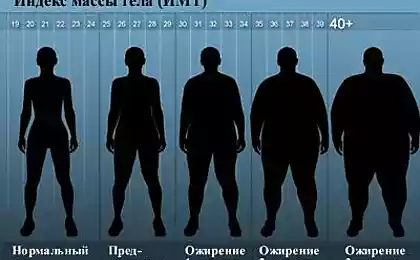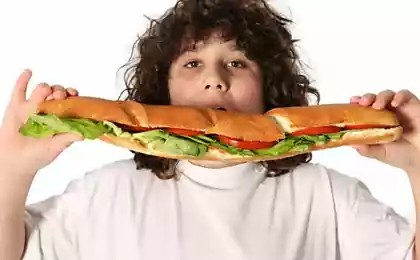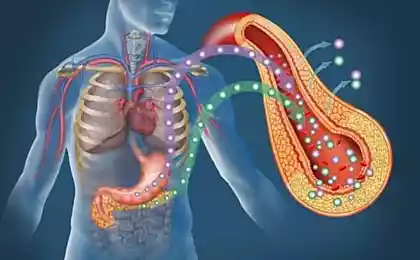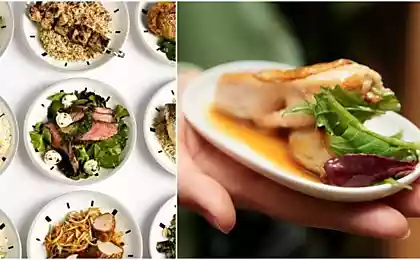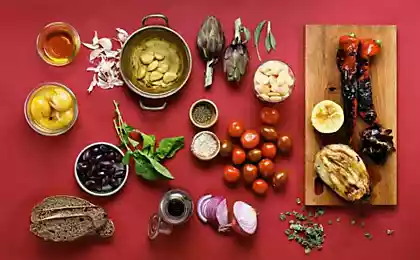208
Overeating and self-esteem
“Intuitive nutrition” by Svetlana Bronnikova – in my opinion, not only the book of the year on the problem of overeating and losing weight, but also the best of all that was written in Russian on this topic. First of all, because it reveals the psychological causes of overeating – body shame, negative emotions, low self-esteem – and provides effective techniques that help to establish a healthy relationship with food.
Unlike nutritionists who write similar manuals, Svetlana Bronnikova draws on her experience as a psychotherapist helping people with eating disorders. She suggests looking at the problem not superficially, “my life in calories: how much I ate and how much I spent”, but more deeply – to analyze your memories, fears and dreams, learn to listen and love your body. Another obvious advantage of the book is that the author is well acquainted with the scientific literature and research on the topic of overeating and generously shares them with readers.
Here are a few quotes and exercises from the book that show how you can simultaneously stop gluttony and increase self-esteem, since they are directly related to each other.

1. “If you do not feel the importance and value of yourself and your body as a phenomenon, you will eat carelessly and hastily. The ability to stop at satiety is closely related to a person’s ability to take care of themselves, respect their needs.”
2. “The most typical feature of people who are overweight is meeting the needs of others. When we tell ourselves that we will take care of our needs later, after doing something for someone else, we actually recognize ourselves as less valuable than others. To go to work with a fever is to recognize that the needs of the boss are more important than ours.
I feel my inability. say noWhen I am asked to help, moreover, I find myself constantly getting involved in a situation where it is necessary to sacrifice my time, money, and energy for the benefit of someone else.
Recognising that other people’s needs are always prioritized over one’s own is an extremely low sense of self-worth. If I feel low in value, then love and recognition must be acquired by work. And the "plizer" rushes to commit multiple acts of self-sacrifice, unable to stop. To not save anyone and not to help anyone is to feel a strong sense of guilt: my existence is not justified. A constant sense of guilt is a characteristic feature of people with a disturbed type of nutrition.”
3. “Every time I sacrifice my needs, I hurt myself, I get hurt, and I feel, whether I like it or not, a strong sense of anger. Not knowing how to express it, panicking about losing the love of others because I allowed myself to get angry, I swallow my anger. It is this hidden function that most often carry bouts of gluttony: hide, suppress, strangle, drown in calories the raging anger inside.
Over time, relationships A person who is used to suppressing angerThey change with other people. There is no relationship without conflict. If my goal is to completely avoid conflict, then my goal is to avoid intimacy. I begin to function at some distance with a loved one without touching them. Indeed, then there is no conflict.”
Since I regularly commit acts of violence against my own body (everyone knows the feeling of sickness from overeating), I also dissociate with the body, that is, try to exist with it at a distance. I cease to feel that I eat, drink, I cease to feel almost anything but intense physical pain – or blissful nothingness. There comes a state of detachment from their own emotions, comparable to that experienced by people taking strong antidepressants for a long time.
And this shows the power of overeating as a powerful magical act. Overeating allows you to magically control reality and change it at will. That is why it is not so easy to abandon.”
4. "The unconscious overeating It is full of negative beliefs about itself, a kind of spell for failure, failure, beauty. There are tangles of such thoughts nesting in a person’s head – I am unattractive, I am not smart enough, I am not talented. I don't know what to do with my life, I'm a loser, I'm a bad mother and wife, a bad father or a specialist. All this is a manifestation of low self-esteem. In a completely irrational way, I’m convinced that I’ll be OK if my body is OK. I will become slim and beautiful - I will feel like a good daughter, mother or wife. Before that, neither.
Perfectionism is when the result becomes more valuable to me than myself.
5. “There is no better way to start working with your ‘plizering’ (satisfying the needs of others at the expense of your own) than there is at a time when you have a need for it. Having won back from yourself and others the right to eat when and what you want, you can hope that the feeling that you are right will begin to spread to other areas of life. Usually, at first, this manifests itself in outbursts of sudden, uncharacteristic anger and irritation where you used to behave modestly and imperceptibly. Don’t worry, this is how your autonomy is created. Anger soon passes, giving way to the calm feeling of “I have the right to do so”, and this is an important stage not so much in the adjustment of nutrition as in the formation of a mature personality.
You are angry, sad, frustrated, you are no longer a “cute person” and can state your needs. Of course, you have become less comfortable with others, but much more mentally healthy and happy. Negative emotions, despite the fact that it is unpleasant to experience them, make us more alive, and our life more vivid and rich.”
6. “Eating exactly what you want at the moment means asking yourself before you start a meal, what kind of food will satisfy and fill your body best?” If it is difficult to imagine a dish or product, start with taste (you want sweet, salty, sour, spicy, spicy?), texture (crispy, soft, juicy, dense, airy?) and temperature (hot, cold?)
During each meal, periodically lay down a fork and knife or spoon and listen to yourself. You can start by eating about half a meal. Start with the taste question: How much of what you’re eating now fits your taste? Do you like this food, was it a good choice?
Periodically check if your food remains as tasty as it was when you started eating. Reducing the feeling of “deliciousness”, experiencing the brightness of taste is one of the first, early signals of saturation.
Don’t be afraid to eat too much. It is possible that even if you catch the signals of satiety, you will want to continue eating. It's okay. Do this without criticism, consciously and calmly. Say to yourself, “I’m full, but I still want another piece.” I understand it's not hunger. Interesting. Why would I want more? This is a good time to explore the causes of your overeating. Remind yourself that everyone overeats from time to time.
If you really can’t decide what you want, don’t panic. Eat something with a neutral taste - a slice of bread, some pasta, half a glass of milk, some boiled rice or buckwheat, lentils. Try to ask in what direction the desired taste should have differed from the one you just experienced. Sour? Sharp? More dense? And observe, observe your life – how often you do what you really want, how often your choices are dictated by your own desires and needs, not by considerations of “how it should be right.”
Two exercises that help to establish a conscious intuitive eating – eat less, but get more pleasure from eating.
"Exercise 5-4-3-2-1"
This exercise should be done before every meal, whether you eat or just snack, drink tea. It helps to be completely in the present moment, to experience the experience of eating as full, not to be absent from the mind or body, not to be anywhere else.
Raisin exercise
Choose your free time – this exercise should be done very slowly. Instead of raisins, you can take a small candy, a slice of chocolate, any product that you tend to “eat like seeds.” It is especially useful to perform before eating, and can be repeated several times throughout the day.
1. Put in the palm of your hand a single raisin, nut, seed or popcorn seed. Take a good look at it. Mark the color of the surface, wrinkles or cracks on it.
2. Add another raisin. Compare them. How are they similar and how are they different?
3. Ride the raisins between your thumb and index finger. How do you feel? Softness? Hardness? Roughness? Sticky?
4. Put one raisin in your mouth, but don’t start chewing. Ride it on your tongue. How do you feel now? What's the texture in your mouth?
5. Now start chewing. Note the changes in texture and taste. Slowly chew and swallow raisins, feel how it slides down into the esophagus.
6. Repeat with the second raisin. How do you feel different? How does your experience differ from how you normally eat?
Author: Ksenia Tatarnikova
P.S. And remember, just changing our consumption – together we change the world!
Join us on Facebook, VKontakte, Odnoklassniki
Source: smart-cookie.ru/weight-loss/pereedanie-i-samoocenka/
Unlike nutritionists who write similar manuals, Svetlana Bronnikova draws on her experience as a psychotherapist helping people with eating disorders. She suggests looking at the problem not superficially, “my life in calories: how much I ate and how much I spent”, but more deeply – to analyze your memories, fears and dreams, learn to listen and love your body. Another obvious advantage of the book is that the author is well acquainted with the scientific literature and research on the topic of overeating and generously shares them with readers.
Here are a few quotes and exercises from the book that show how you can simultaneously stop gluttony and increase self-esteem, since they are directly related to each other.

1. “If you do not feel the importance and value of yourself and your body as a phenomenon, you will eat carelessly and hastily. The ability to stop at satiety is closely related to a person’s ability to take care of themselves, respect their needs.”
2. “The most typical feature of people who are overweight is meeting the needs of others. When we tell ourselves that we will take care of our needs later, after doing something for someone else, we actually recognize ourselves as less valuable than others. To go to work with a fever is to recognize that the needs of the boss are more important than ours.
I feel my inability. say noWhen I am asked to help, moreover, I find myself constantly getting involved in a situation where it is necessary to sacrifice my time, money, and energy for the benefit of someone else.
Recognising that other people’s needs are always prioritized over one’s own is an extremely low sense of self-worth. If I feel low in value, then love and recognition must be acquired by work. And the "plizer" rushes to commit multiple acts of self-sacrifice, unable to stop. To not save anyone and not to help anyone is to feel a strong sense of guilt: my existence is not justified. A constant sense of guilt is a characteristic feature of people with a disturbed type of nutrition.”
3. “Every time I sacrifice my needs, I hurt myself, I get hurt, and I feel, whether I like it or not, a strong sense of anger. Not knowing how to express it, panicking about losing the love of others because I allowed myself to get angry, I swallow my anger. It is this hidden function that most often carry bouts of gluttony: hide, suppress, strangle, drown in calories the raging anger inside.
Over time, relationships A person who is used to suppressing angerThey change with other people. There is no relationship without conflict. If my goal is to completely avoid conflict, then my goal is to avoid intimacy. I begin to function at some distance with a loved one without touching them. Indeed, then there is no conflict.”
Since I regularly commit acts of violence against my own body (everyone knows the feeling of sickness from overeating), I also dissociate with the body, that is, try to exist with it at a distance. I cease to feel that I eat, drink, I cease to feel almost anything but intense physical pain – or blissful nothingness. There comes a state of detachment from their own emotions, comparable to that experienced by people taking strong antidepressants for a long time.
And this shows the power of overeating as a powerful magical act. Overeating allows you to magically control reality and change it at will. That is why it is not so easy to abandon.”
4. "The unconscious overeating It is full of negative beliefs about itself, a kind of spell for failure, failure, beauty. There are tangles of such thoughts nesting in a person’s head – I am unattractive, I am not smart enough, I am not talented. I don't know what to do with my life, I'm a loser, I'm a bad mother and wife, a bad father or a specialist. All this is a manifestation of low self-esteem. In a completely irrational way, I’m convinced that I’ll be OK if my body is OK. I will become slim and beautiful - I will feel like a good daughter, mother or wife. Before that, neither.
Perfectionism is when the result becomes more valuable to me than myself.
5. “There is no better way to start working with your ‘plizering’ (satisfying the needs of others at the expense of your own) than there is at a time when you have a need for it. Having won back from yourself and others the right to eat when and what you want, you can hope that the feeling that you are right will begin to spread to other areas of life. Usually, at first, this manifests itself in outbursts of sudden, uncharacteristic anger and irritation where you used to behave modestly and imperceptibly. Don’t worry, this is how your autonomy is created. Anger soon passes, giving way to the calm feeling of “I have the right to do so”, and this is an important stage not so much in the adjustment of nutrition as in the formation of a mature personality.
You are angry, sad, frustrated, you are no longer a “cute person” and can state your needs. Of course, you have become less comfortable with others, but much more mentally healthy and happy. Negative emotions, despite the fact that it is unpleasant to experience them, make us more alive, and our life more vivid and rich.”
6. “Eating exactly what you want at the moment means asking yourself before you start a meal, what kind of food will satisfy and fill your body best?” If it is difficult to imagine a dish or product, start with taste (you want sweet, salty, sour, spicy, spicy?), texture (crispy, soft, juicy, dense, airy?) and temperature (hot, cold?)
During each meal, periodically lay down a fork and knife or spoon and listen to yourself. You can start by eating about half a meal. Start with the taste question: How much of what you’re eating now fits your taste? Do you like this food, was it a good choice?
Periodically check if your food remains as tasty as it was when you started eating. Reducing the feeling of “deliciousness”, experiencing the brightness of taste is one of the first, early signals of saturation.
Don’t be afraid to eat too much. It is possible that even if you catch the signals of satiety, you will want to continue eating. It's okay. Do this without criticism, consciously and calmly. Say to yourself, “I’m full, but I still want another piece.” I understand it's not hunger. Interesting. Why would I want more? This is a good time to explore the causes of your overeating. Remind yourself that everyone overeats from time to time.
If you really can’t decide what you want, don’t panic. Eat something with a neutral taste - a slice of bread, some pasta, half a glass of milk, some boiled rice or buckwheat, lentils. Try to ask in what direction the desired taste should have differed from the one you just experienced. Sour? Sharp? More dense? And observe, observe your life – how often you do what you really want, how often your choices are dictated by your own desires and needs, not by considerations of “how it should be right.”
Two exercises that help to establish a conscious intuitive eating – eat less, but get more pleasure from eating.
"Exercise 5-4-3-2-1"
This exercise should be done before every meal, whether you eat or just snack, drink tea. It helps to be completely in the present moment, to experience the experience of eating as full, not to be absent from the mind or body, not to be anywhere else.
- Identify the 1st smell you feel right now.
- Name the 2 sounds you are currently hearing (the beat of your own heart counts).
- Describe the 3 bodily sensations your body is experiencing right now (the texture of the clothes that touch the skin, the temperature, how your feet rest on the ground).
- Name the 4 colors that surround you.
- Name the 5 items that are in front of you.
Raisin exercise
Choose your free time – this exercise should be done very slowly. Instead of raisins, you can take a small candy, a slice of chocolate, any product that you tend to “eat like seeds.” It is especially useful to perform before eating, and can be repeated several times throughout the day.
1. Put in the palm of your hand a single raisin, nut, seed or popcorn seed. Take a good look at it. Mark the color of the surface, wrinkles or cracks on it.
2. Add another raisin. Compare them. How are they similar and how are they different?
3. Ride the raisins between your thumb and index finger. How do you feel? Softness? Hardness? Roughness? Sticky?
4. Put one raisin in your mouth, but don’t start chewing. Ride it on your tongue. How do you feel now? What's the texture in your mouth?
5. Now start chewing. Note the changes in texture and taste. Slowly chew and swallow raisins, feel how it slides down into the esophagus.
6. Repeat with the second raisin. How do you feel different? How does your experience differ from how you normally eat?
Author: Ksenia Tatarnikova
P.S. And remember, just changing our consumption – together we change the world!
Join us on Facebook, VKontakte, Odnoklassniki
Source: smart-cookie.ru/weight-loss/pereedanie-i-samoocenka/
General cleaning of your life: nacrite from their house in order!
No longer marginalized: what the new unconscious and what it differs from the old one
